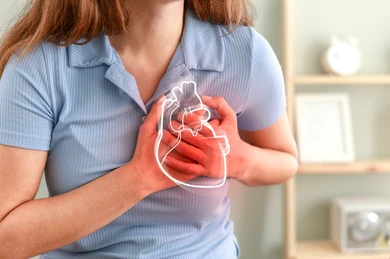
Cardiac Symptoms

Chest Pain:
Chest pain has many different causes including heart problems, which could vary from benign conditions like pericarditis to more serious problems like heart attack, angina, or heart rhythm abnormalities. You are more at risk of developing heart problems if you have risk factors such as:
- High cholesterol
- Smoking
- Obesity
- High blood pressure
- diabetes
- Family history of heart disease in first degree relatives aged <60 years.
If you are worried about your symptoms, you should consult a doctor for further assessment and may need some tests
Breathlessness
Breathlessness can be caused by variety of health problems, varying from physical to mental health problems. Most common causes for breathlessness include low blood counts (anaemia), physical deconditioning, heart conditions such as heart failure, a form of angina (due to lack of blood supply to heart muscle caused by narrowing of heart arteries) and lung problems such as asthma and smoking related lung disease (COPD).
If you become breathless on exertion or start to develop chest tightness on effort, have difficulty lying flat due to breathlessness or start to develop leg swelling, you may have possible heart related condition and therefore should consult a doctor at the earliest.


PoTS (Postural Tachycardia Syndrome)
Postural tachycardia syndrome (PoTS) is when your heart rate increases very quickly after getting up from sitting or lying down. It can get better with changes to your lifestyle, but some people may need treatment with medicines.
It’s also known as postural orthostatic tachycardia syndrome. It causes variety of symptoms including palpitations, dizziness, extreme fatigue, fainting or near-fainting on standing, chest pain and brain fog.
Some patients can also experience multiple other symptoms. If you are experiencing such symptoms, you should see a specialist early as diagnosis can be challenging due to symptoms being vague and often present in variety of other cardiac conditions.
Atrial Fibrillation
Atrial fibrillation is a very common heart rhythm disturbance. It is not immediately life-threatening heart rhythm problem but does carry risk of quite serious health problems, if not treated appropriately. At times it is picked up incidentally when health professional checks your pulse or perform an ECG for an unrelated reason.
However, it usually causes symptoms such as rapid heart beating (palpitations), breathlessness, chest pain or stroke which can be quite catastrophic.
Those patients who have been diagnosed with atrial fibrillation and carry certain risk factors are at higher risk of stroke. Fortunately, this risk can be mitigated by your doctor prescribing you blood thinning medications. Your other symptoms can also be treated with medications.


Fainting/Blackouts
Fainting is relatively common symptom and vast majority of people will experience one, at least once in their life time. It can be due to very benign condition or a marker of underlying serious life- threatening heart problem.
Most common reason in younger age (< 40 years) is due to blood pressure regulatory problems. In older age groups and those patients who have known heart condition such as previous heart attack, heart failure or heart valve problems, it can be marker of serious life-threatening condition and a warning symptom to seek urgent medical help.
If you have recurring blackouts and or have first episode resulting in injury or known to have one of the above heart conditions then you need to see specialist at the earliest.
Heart Failure
Heart Failure means that heart is unable to pump blood efficiently around the body. This can develop relatively quickly or weeks and months. This can result from either heart muscle weakness or stiffness.
This usually means your heart needs support to start working better again. Although this can occur at any age, it usually affects old patients. Those who have high blood pressure or previous heart attack are more at-risk developing heart failure at some stage.
Patients will generally experience breathlessness, fatigue, difficulty sleeping at night comfortably and leg swelling. Other symptoms include exhaustion, dizziness, fainting and abdominal swelling. If you are experiencing any such symptoms then you should consult a doctor for advice.


Heart Murmur
A heart murmur is an additional sound made by blood as it passes through the heart and blood vessels heard when doctor listens to your heartbeat.
A heart murmur does not always mean a heart problem but can be sign of heart valve problem. If you are known to have heart murmur and now have started to experience symptoms such as breathlessness, chest pain or blackouts then you should see a doctor for advice.
Heart valve disease can progress and at times needs medication adjustments or even consideration for a corrective procedure.
Palpitations
Palpitations is awareness of your own beating. Short lived palpitations are very common and not necessarily worrying. If you are experiencing recurrent, prolonged bouts of palpitations or a sensation of your heart racing you may have an abnormality in heart rhythm.
An arrhythmia is a disturbance of the normal heart rhythm and can be accompanied by other symptoms such as chest pain or fainting. Arrhythmias can be benign with the symptoms being a nuisance, or they can be more dangerous particularly if accompanied by fainting or blackout.
If your palpitations have become intrusive or associated with breathlessness, chest pain, fainting or experiencing them on exertion then you should consult a doctor for formal assessment and advice..


High Blood Pressure
High blood pressure, also called hypertension is very common in the UK. If you have hypertension and it is not treated properly it can lead to heart attack, stroke, heart failure and kidney failure.
You may already have high blood pressure but find that despite taking several medications for it your blood pressure measurements are still high.
Sometimes persistently high blood pressure can be due to other causes called ‘secondary hypertension’. Secondary hypertension may account for up to 30% of diagnoses of young onset hypertension (<25 year). Thyroid dysfunction, kidney problems, such as narrowing/blockage of kidney blood vessels are the most common causes of secondary hypertension in younger patients.
If you have problematic blood pressure control or just been diagnosed with high blood pressure in young age then you should consult a specialist to determine most appropriate treatment plan and need for further tests.
